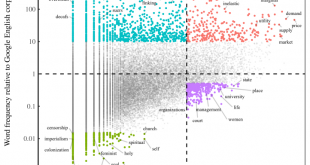from Asad Zaman Launched in early 20th Century by Ragnar Frisch, econometric methodology was strongly shaped by the Cowles Commission (CC) in the 1960’s. The CC approach relied on structural equations, which embodied causal information known in advanced to the researcher. The goal was estimation of causal effects, and not discovery or assessment of the hypothesized causal structures. The oil shock of the 1970’s led to dramatic failures of macroeconomic regression models, leading to...
Read More »The tools economists use
from Lars Syll In their quest for statistical “identification” of a causal effect, economists often have to resort to techniques that answer either a narrower or a somewhat different version of the question that motivated the research. Results from randomized social experiments carried out in particular regions of, say, India or Kenya may not apply to other regions or countries. A research design exploiting variation across space may not yield the correct answer to a question that is...
Read More »Weekend Read – Power … and the dialect of economics
from Blair Fix If you’ve ever taken Economics 101, then you’re familiar with its jargon. In the course, you probably heard the words ‘supply and demand’ and ‘marginal utility’ uttered hundreds of times. As you figured out what these words meant, you gradually learned to speak a dialect that I call econospeak. Like all dialects, econospeak affects how you express ideas. The vocabulary of econospeak makes it easier to express certain ideas (such as ‘market equilibrium’), but harder to...
Read More »Neoliberal economic theory is covertly racist
from John Komlos Mainstream economics –as taught to well over a million students a year in the U.S. alone –is replete with implications that feed into structural racism.[i] That should not be misinterpreted to imply that economists themselves are racist. Rather, the market fundamentalism they promulgate have the unintended consequence of providing ample justification for maintaining the economic status quo which privileges the well-to-do but finds most minorities at the lower end of the...
Read More »WEA Commentaries – new issue
WEA Commentaries Volume 11, Issue 1 – April 2021 download the whole issue Review of Internet Oligopoly: The Corporate Takeover of our Digital WorldMitja Stefancic The puzzle of western social science Asad Zaman Taking the Dasgupta Review seriously (with an interview with Professor Partha Dasgupta)Mitja Stefancic A New Book on the Economics of Gift Stuart Birks interviews Ioana Negru US Government SpendingDean Baker Please click here to support the WEA...
Read More »Econometrics — science based on whimsical assumptions
from Lars Syll It is often said that the error term in a regression equation represents the effect of the variables that were omitted from the equation. This is unsatisfactory … There is no easy way out of the difficulty. The conventional interpretation for error terms needs to be reconsidered. At a minimum, something like this would need to be said: The error term represents the combined effect of the omitted variables, assuming that (i) the combined effect of the omitted variables is...
Read More »Mariana Mazzucato, Jayati Ghosh and Els Torreele on waiving covid patents
The Rapid creation of covid-19 vaccines is an amazing technological feat. It shows how much can be accomplished when human inventiveness and private-sector involvement are given extensive public support, from basic research to massive subsidies. However, the innovation is futile unless the vaccines are distributed equitably. The public-health benefits are undermined by a deepening chasm in availability. With most inoculations occurring in just a few rich countries and the vast majority of...
Read More »The technological bright blue yonder?
from Peter Radford One of the greatest shifts subsequent to the rise of machinery and industrialization is the social acceptance of apparently never-ending technological change. A change, moreover, that we are told will inevitably lead us all towards an improved, more prosperous, healthier, and happier existence. That this future cannot be precisely determined or known to us is set aside, we simply accept the drumbeat of change and presume the rest. Or at least that’s one view. How...
Read More »The tragedy of the Macro: argumentativeness and intolerance
from Thomas Palley Almost fifty years ago the renowned Swedish econographer, Professor Axel Leijonhufvud (1973), wrote a seminal study on the Econ tribe titled “Life among the Econ”. Back then the Econ were divided into sub-tribes which referred to themselves as the Micro and the Macro. . . . The new sectarian make-up of the Macro can be traced back to the doctrines of “K” and “M” which Professor Leijonhufvd identified fifty years ago. The doctrine of K concerns itself with what is the...
Read More »Who’s afraid of MMT?
from Lars Syll As anyone who has ever been responsible for legislative oversight of central bankers knows, they do not like to have their authority challenged. Most of all, they will defend their mystique – that magical aura that hovers over their words, shrouding a slushy mix of banality and baloney in a mist of power and jargon … In our day, the voices of Modern Monetary Theory perturb the sleep not only of present central bankers, but even of those retired from the role. They prowl the...
Read More » Real-World Economics Review
Real-World Economics Review




